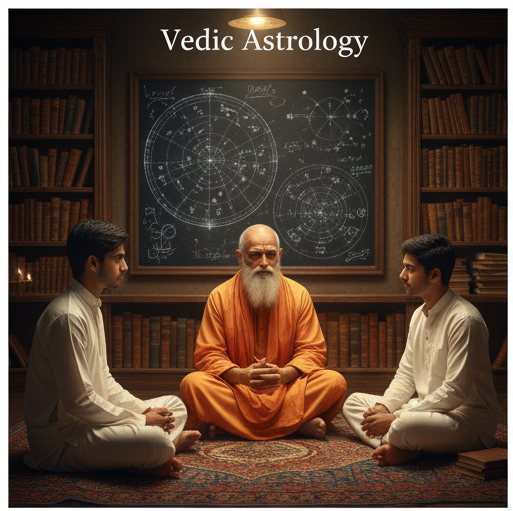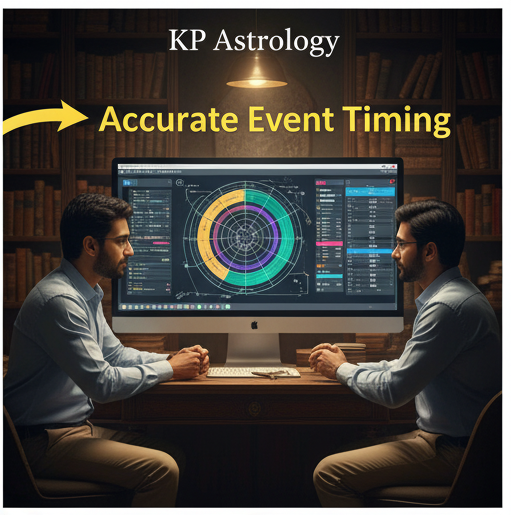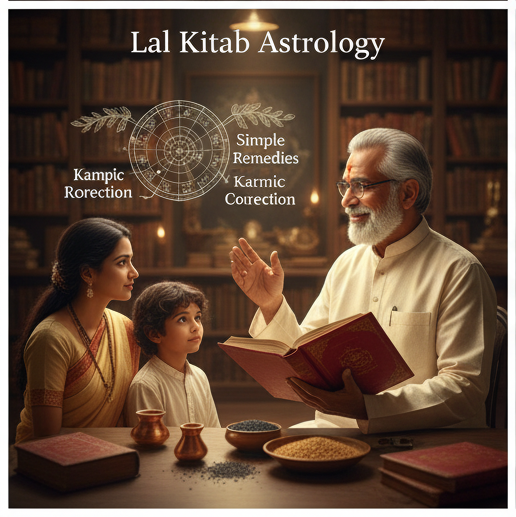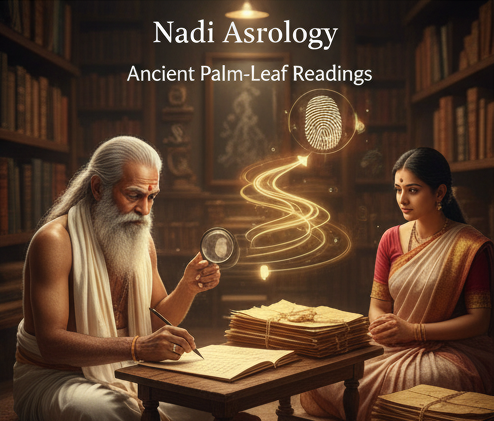
Free Indian Astrology: From Sacred Texts to Online Courses and Top Astrologers
September 5, 2025 | 15 mins read
Free Indian Astrology: From Sacred Texts to Online Courses and Top Astrologers
The Enduring Legacy of Jyotish: A Sacred Science

The philosophical core of Jyotish is deeply intertwined with the concepts of destiny and free will. According to the Vedas, a person’s future is a product of both these forces, and their thoughts and actions—their karma—shape their future destiny. Vedic astrology is, therefore, a map of this karma, designed to help individuals understand their true nature and navigate their lives toward fulfilling the four goals of human life ( purusharthas): dharma (purpose or righteous conduct), artha (the acquisition of wealth and security), kama (desire), and moksha (spiritual liberation). This ancient understanding positions the practice as a life-transforming tool rather than a simple predictive mechanism. The historical evolution of Jyotish from an astronomical science to a profound system for understanding personal karma demonstrates that the field is inherently dynamic. This tradition of adaptation provides a logical foundation for the new era of astrology, where modern technology is simply the latest tool to meet society's evolving needs for guidance and self-understanding.
Navigating the Complex Cosmos of Indian Astrology
One of the most foundational distinctions in the world of celestial prediction is the difference between Vedic and Western astrology. A primary point of confusion for beginners is the use of different zodiacs. Vedic astrology is based on the sidereal zodiac, which accounts for the Earth’s axial wobble, a phenomenon known as precession. This wobble causes the Earth’s ecliptic plane to shift by approximately one degree every 72 years, and over the past 2,000 years, this has created a noticeable astronomical time shift. As a result, the Vedic system uses an astronomically accurate, updated ecliptic path, while Western astrology adheres to the old, symbolic, and fixed path. This intellectual distinction highlights the logical and scientific rigor that is inherent in the Jyotish tradition.
The discipline of Indian astrology is far from a monolithic practice. It encompasses several diverse and intricate schools of thought, each with its own methodology and purpose. This variety demonstrates that a truly competent practitioner must have a multi-faceted understanding of the field.
- Vedic Astrology (Jyotish): This is the classical system, rooted in the Vedas. It relies on the sidereal zodiac, divisional charts (Shodasha Vargas), and the Vimshottari Dasha system to time events. Its primary purpose is to provide a comprehensive life map, offering insights into an individual's karma, spirituality, and overall life path. Free Vedic Astrology and Numerology With Vivek Vats Sir Link
- KP Astrology: A more modern, technology-driven system developed by the late Prof. K.S. Krishnamurti, KP astrology focuses on the Nakshatras (stellar constellations) for hyper-specific and precise predictions. It differs from the traditional Vedic system by using c ups (the connecting nodes of two houses) and a different Ayanamsha to pinpoint the timing of events with greater accuracy. Free KP Astrology With Prof Krishna Murli Eswar Sir Link
- Lal Kitab Astrology: This is a highly practical offshoot of Vedic astrology, written in Persian/Urdu, with a unique set of principles. The system is less ritualistic, providing simple, accessible remedies and placing a greater emphasis on the houses rather than the zodiac signs. It operates on the unique principle that every birth chart has a fixed Aries ascendant, and its focus is on correcting previous life's karma through easy-to-implement dos and don’ts. Free Lal Kitab Astrology With Dr. Mahesh Mankar Sir Link
- Nadi Astrology India: A deeply esoteric branch, Nadi astrology India is based on the belief that the lives of many individuals were foreseen and recorded on ancient palm leaves by sages like Maharishi Agastya thousands of years ago. A seeker is guided to their specific leaf by their thumbprint, and the reading is seen as a direct reflection of their karma. This system is considered highly detailed and accurate but requires an extremely precise birth time and the astrologer to physically possess the correct leaf for a reading to be performed. Free Nadi Astrology With Dinesh Guruji Sir Link
The existence of these diverse methodologies indicates that a truly effective practitioner must be well-versed in more than one system. The differences in approach—for example, KP's focus on precise timing versus Lal Kitab's emphasis on practical remedies—highlights the need for a comprehensive and multi-disciplinary education. This complexity provides a powerful argument for a structured learning environment that teaches a holistic curriculum, enabling students to choose the best approach for a given problem. The intellectual nature of these systems, grounded in astronomical and mathematical principles, provides a strong counterpoint to the common misconception of astrology as a superstition. It frames the subject as a structured discipline with logical foundations, appealing to those seeking more than just mystical answers.
In astrology, the stars are more than just distant lights. They are a map, a guide to understanding ourselves and our journey. While many are familiar with a simple zodiac sign reading, the world of astrology is far more intricate, with multiple systems offering different insights.
Here's a look at some of the most respected forms of Indian astrology, each with its unique approach to helping you navigate your path.
Vedic Astrology (Jyotish)

KP Astrology

Lal Kitab Astrology

Nadi Astrology

The Digital Renaissance: From Sacred Spaces to Online Services
The Path to Mastery: Learning Indian Astrology in the Digital Age


Final Thoughts and a Call to Action

Free Indian Astrology: From Sacred Texts to Online Courses and Top Astrologers
The Enduring Legacy of Jyotish: A Sacred Science

The philosophical core of Jyotish is deeply intertwined with the concepts of destiny and free will. According to the Vedas, a person’s future is a product of both these forces, and their thoughts and actions—their karma—shape their future destiny. Vedic astrology is, therefore, a map of this karma, designed to help individuals understand their true nature and navigate their lives toward fulfilling the four goals of human life ( purusharthas): dharma (purpose or righteous conduct), artha (the acquisition of wealth and security), kama (desire), and moksha (spiritual liberation). This ancient understanding positions the practice as a life-transforming tool rather than a simple predictive mechanism. The historical evolution of Jyotish from an astronomical science to a profound system for understanding personal karma demonstrates that the field is inherently dynamic. This tradition of adaptation provides a logical foundation for the new era of astrology, where modern technology is simply the latest tool to meet society's evolving needs for guidance and self-understanding.
Navigating the Complex Cosmos of Indian Astrology
One of the most foundational distinctions in the world of celestial prediction is the difference between Vedic and Western astrology. A primary point of confusion for beginners is the use of different zodiacs. Vedic astrology is based on the sidereal zodiac, which accounts for the Earth’s axial wobble, a phenomenon known as precession. This wobble causes the Earth’s ecliptic plane to shift by approximately one degree every 72 years, and over the past 2,000 years, this has created a noticeable astronomical time shift. As a result, the Vedic system uses an astronomically accurate, updated ecliptic path, while Western astrology adheres to the old, symbolic, and fixed path. This intellectual distinction highlights the logical and scientific rigor that is inherent in the Jyotish tradition.
The discipline of Indian astrology is far from a monolithic practice. It encompasses several diverse and intricate schools of thought, each with its own methodology and purpose. This variety demonstrates that a truly competent practitioner must have a multi-faceted understanding of the field.
- Vedic Astrology (Jyotish): This is the classical system, rooted in the Vedas. It relies on the sidereal zodiac, divisional charts (Shodasha Vargas), and the Vimshottari Dasha system to time events. Its primary purpose is to provide a comprehensive life map, offering insights into an individual's karma, spirituality, and overall life path. Free Vedic Astrology and Numerology With Vivek Vats Sir Link
- KP Astrology: A more modern, technology-driven system developed by the late Prof. K.S. Krishnamurti, KP astrology focuses on the Nakshatras (stellar constellations) for hyper-specific and precise predictions. It differs from the traditional Vedic system by using c ups (the connecting nodes of two houses) and a different Ayanamsha to pinpoint the timing of events with greater accuracy. Free KP Astrology With Prof Krishna Murli Eswar Sir Link
- Lal Kitab Astrology: This is a highly practical offshoot of Vedic astrology, written in Persian/Urdu, with a unique set of principles. The system is less ritualistic, providing simple, accessible remedies and placing a greater emphasis on the houses rather than the zodiac signs. It operates on the unique principle that every birth chart has a fixed Aries ascendant, and its focus is on correcting previous life's karma through easy-to-implement dos and don’ts. Free Lal Kitab Astrology With Dr. Mahesh Mankar Sir Link
- Nadi Astrology India: A deeply esoteric branch, Nadi astrology India is based on the belief that the lives of many individuals were foreseen and recorded on ancient palm leaves by sages like Maharishi Agastya thousands of years ago. A seeker is guided to their specific leaf by their thumbprint, and the reading is seen as a direct reflection of their karma. This system is considered highly detailed and accurate but requires an extremely precise birth time and the astrologer to physically possess the correct leaf for a reading to be performed. Free Nadi Astrology With Dinesh Guruji Sir Link
The existence of these diverse methodologies indicates that a truly effective practitioner must be well-versed in more than one system. The differences in approach—for example, KP's focus on precise timing versus Lal Kitab's emphasis on practical remedies—highlights the need for a comprehensive and multi-disciplinary education. This complexity provides a powerful argument for a structured learning environment that teaches a holistic curriculum, enabling students to choose the best approach for a given problem. The intellectual nature of these systems, grounded in astronomical and mathematical principles, provides a strong counterpoint to the common misconception of astrology as a superstition. It frames the subject as a structured discipline with logical foundations, appealing to those seeking more than just mystical answers.
In astrology, the stars are more than just distant lights. They are a map, a guide to understanding ourselves and our journey. While many are familiar with a simple zodiac sign reading, the world of astrology is far more intricate, with multiple systems offering different insights.
Here's a look at some of the most respected forms of Indian astrology, each with its unique approach to helping you navigate your path.
Vedic Astrology (Jyotish)

KP Astrology

Lal Kitab Astrology

Nadi Astrology

The Digital Renaissance: From Sacred Spaces to Online Services
The Path to Mastery: Learning Indian Astrology in the Digital Age


Final Thoughts and a Call to Action

You May Like these Blogs Too
How Astrology Helps in Choosing the First Letter of Baby’s Name
Astrology plays a vital role in choosing the first letter of a baby’s name by aligning it with the child’s birth star and Moon sign. This traditional approach, often followed during the baby naming ceremony, is believed to support emotional balance, prosperity, and overall well-being. By blending astrological guidance with modern naming preferences, parents can choose meaningful names while honoring tradition. Word Count: ~1,250 words
6 min read
1267 views
Can Astrology Make You Rich Like Ambani? Who Is Ambani, Truth vs Myth About Wealth Astrology
Can astrology really make someone rich like Ambani? This article explores the truth behind wealth astrology, explains what astrology can and cannot do, and breaks the myth of instant riches. Learn how astrology supports financial clarity, timing, and decision-making, without unrealistic promises.
6 min read
459 views
Lal Kitab Remedies & Totke in Hindi (PDF): Kundli, Upay, Rahu Ke Upay & Original Lal Kitab Guide
Lal Kitab offers simple yet powerful astrology remedies rooted in daily actions and behavior correction. This detailed guide explores authentic Lal Kitab remedies, totke, Kundli-based upay, Rahu ke upay, and the importance of using an original Lal Kitab PDF in Hindi. Written from the perspective of a Lal Kitab Astrologer at Astrolearn, the article focuses on practical, ethical, and proven solutions for real-life problems.Lal Kitab offers simple yet powerful astrology remedies rooted in daily actions and behavior correction. This detailed guide explores authentic Lal Kitab remedies, totke, Kundli-based upay, Rahu ke upay, and the importance of using an original Lal Kitab PDF in Hindi. Written from the perspective of a Lal Kitab Astrologer at Astrolearn, the article focuses on practical, ethical, and proven solutions for real-life problems.
7 min read
1145 views
January 2026 Detailed Horoscope: Love, Career, Money, Health for Each Zodiac Sign
January 2026 begins the year with strong Capricorn energy, pushing you toward structure, discipline, and strategic progress. This month’s horoscope highlights clear opportunities in career, money, relationships, and personal habits. With a powerful New Moon in Capricorn and an expressive Full Moon in Leo, January asks you to set grounded goals and step confidently into visibility. This is the month to build momentum and create a foundation for the entire year ahead.
6 min read
9091 views
December Horoscope 2025: Year-End Results, Major Transits & Final Predictions for All Zodiac Signs
December 2025 brings closure, clarity, and karmic results as Jupiter, Saturn, and Mercury shape the final energies of the year. This month delivers practical guidance for each zodiac sign, highlighting work, love, money, and health themes, through a crisp, transit-focused lens. A powerful year-end reset.
5 min read
8440 views
Ekadashi Calendar 2025: Dates, Tithis, Parana Timings & Today’s Ekadashi
This comprehensive guide covers Ekadashi Calendar 2025, including Smartha and Vaishnava dates, Tithi timings, Parana rules, and fasting guidelines. Updated with accurate Panchang data, this resource helps devotees observe Ekadashi correctly and spiritually align with Lord Vishnu throughout the year.
8 min read
7547 views
Hindu Calendar January 2026 || Important Dates Festivals and Vrat Explained
A complete guide to the Hindu Calendar January 2026 covering Makar Sankranti, Paush Purnima, Varad Chaturthi, Sankashti Ganesh Chaturthi, Magha Amavasya, and more. This student friendly AstroLearn guide helps you understand each vrat and festival with clarity and warmth. Join our group to download the full 2025 and 2026 Hindu Calendar.
7 min read
12330 views
Hindu Calendar December 2025 || Important Dates, Festivals & Vrat Explained
A complete guide to the Hindu Calendar December 2025 featuring Safala Ekadashi, Putrada Ekadashi, Pausha Purnima, Sankashti Ganesh Chaturthi, Dhanu Sankranti, and Kalashtami. Learn the meaning of each vrat and download the complete 2025 to 2026 Hindu Calendar through AstroLearn.
6 min read
13250 views
Hindu Calendar November 2025 || Important Dates, Festivals & Vrat Explained
A complete guide to the Hindu Calendar November 2025, covering Chhath Puja, Kartik Purnima, Ekadashi dates, Amavasya, Shivaratri, and more. Learn the significance of each festival and join our AstroLearn group to download the full 2025–2026 Hindu Calendar.
8 min read
6977 views
Mystical Triangle: Unlocking the Secrets of Energy and Balance | Ft. Dr. Rohet Sethi
Explore Dr. Rohet Sethi’s Mystical Triangle, a blend of Vedic numerology, sacred geometry, and prediction science. Learn how your date of birth reveals your energy balance and discover a free masterclass to decode your personal triangle at AstroLearn.co.
8 min read
585 views
Top Money Crystals for Attracting Wealth and Prosperity || Astrolearn Ft. Crystal Siri
Discover the top five money crystals: Pyrite, Green Aventurine, Citrine, Calcite, and Yellow Aventurine; that attract wealth, prosperity, and abundance into your life. Learn how to use and activate these crystals through simple rituals and explore the spiritual connection between Vedic Astrology and financial flow. Inspired by Mrs. Veggie’s teachings on Astrolearn.
7 min read
1457 views
Unlocking Wealth: 10 Proven Strategies to Think Like a Millionaire and Build Billionaire-Level Riches
Discover 10 powerful astrology-based strategies to think like a millionaire and attract billionaire-level success. Learn how planetary timing, numerology, and energy alignment shape your path to financial abundance with AstroLearn’s astrology courses.
7 min read
1346 views
Astrological reasons for not Conceiving
Discover the deeper spiritual and karmic causes behind fertility struggles in this insightful blog by AstroLearn. Learn how energy alignment, chakra healing, and Karma Alignment Numerology with Dr. Rohet Sethi can help you overcome conception challenges and reconnect with divine creation energy.
6 min read
684 views
Free Indian Astrology | Courses | Techniques | Remedy | Reports
Free Indian Astrology: How Astrolearn is Empowering Seekers to Master the Ancient Science of Stars
6 min read
924 views
Diwali 2025 Horoscope Predictions: How the Planetary Garland Will Impact Every Zodiac
Discover Diwali 2025 horoscope predictions for every zodiac sign as the rare planetary garland alignment unfolds. This year, the cosmic energies amplify astrological remedies, Nakshatra-based rituals, and occult practices, offering female occult science practitioners unique guidance to manifest abundance, prosperity, and spiritual growth. Learn how each zodiac can harness this Diwali planetary alignment for maximum impact and mystical advantage.
8 min read
2050 views
Free Indian Astrology: From Sacred Texts to Online Courses and Top Astrologers
Free Indian Astrology : Journey with the Best Astrologers, Courses, and Ancient Wisdom
15 min read
2273 views
What is Lal Kitab? Real History, Myths, and Practical Remedies
Lal Kitab Astrology: Unveiling Origins, Authenticity, Impact, and Learning Guide
12 min read
5635 views
Top 5 Astrology Modalities – The Definitive Selection
Discover the most powerful and time-tested astrology modalities chosen through history, impact, and precision. From ancient wisdom to modern predictive systems, explore why these 5 stand out, how they solve real-life problems, and how you can master them under expert guidance. ✨
8 min read
2434 views
Buddh Mangal Yog Meets Janmashtami 2025: Rare Planetary Combination for Wealth, Wisdom, and Success
A once-in-years cosmic event is happening this Janmashtami 2025 — Buddh Mangal Yog. Learn what it means, who benefits the most, and how to use this powerful alignment for wealth, wisdom, and happiness.
3 min read
881 views
Can AI Predict Your Future Better Than a Human Astrologer?
Can AI predict your future better than a human astrologer? This article from Astrolearn explores how AI astrology, AI birth chart readers, and AI horoscope apps use data and machine learning to forecast your destiny and why human intuition still matters. Discover how artificial intelligence astrology is reshaping the future of prediction, blending ancient wisdom with modern technology.
6 min read
6046 views
The Complete Beginner’s Guide to Understand Your Birth Chart
A simple, step-by-step guide for astrology beginners to read and understand their own birth chart — including planets, houses, and zodiac signs.
3 min read
1959 views
AI Astrology: How Artificial Intelligence Reads Your Birth Chart Instantly
Discover how AI astrology is transforming the way birth charts are read. Learn how artificial intelligence astrology tools like AI birth chart readers and AI horoscope apps bring speed, accuracy, and modern insight to traditional Vedic astrology. Written from the perspective of a tech-friendly astrologer at Astrolearn, this article explores the balance between human intuition and machine precision in today’s digital astrology era.
6 min read
10542 views
Why Should You Learn Astrology?
The Stars Have More to Tell Than You Think!
5 min read
4077 views
Shiv Science: Swar Vigyan
Discover the principles of Swar Vigyan, the science of breath, and learn how it can enhance your wellbeing and mindfulness practices.
6 min read
5714 views
Indian Astrology vs Western Astrology : A Cosmic Dance of differences
Dive into the fundamental differences in ideas behind Indian and Western Astrology
4 min read
4031 views